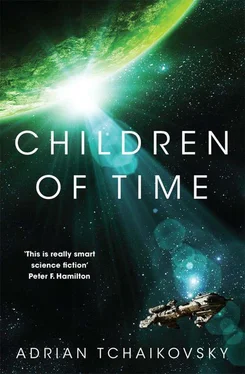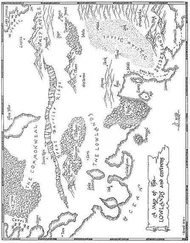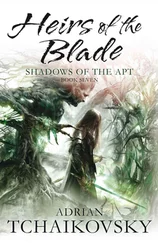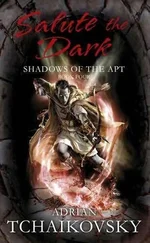Back in Seven Trees, the remaining local males are hard at work. Some have fled, but most of the evacuees are female. Males are replaceable, always underfoot, always too numerous. Many have been instructed to remain in the city until the last, on pain of death. Some have fled anyway, to take their chances, but there are still plenty to cut any remaining lines between the settlement and the ground, to deny the ants easy access. Others are hurrying from the reservoir with silk parcels bulging with water. Portia notes such industry with approval.
The front ranks of the column are nearing. The armoured ants suffer less from the slingshots, but now other ammunition is brought into play. Portia’s people are chemists of a sort. Living in a world where scent is so vital – a small part of their language but a very large part of the way the rest of the world perceives itself – they have developed numerous inherited Understandings with respect to the mixing and compounding of chemical substances, most especially pheromones. Now the slingers are sending over silk-wrapped globules of liquid to splash amongst the advancing ants. The scents thus released briefly cover up the attackers’ own constant scent language – denying them not only speech, but thought and identity. Until the chemicals dissipate, the affected sections of the attacking army are deprogrammed, falling back on base instincts and unable to react properly to the situation around them. They blunder and break formation, and some of them fight each other, unable to recognize their own kin. Portia and the other defenders attack swiftly, killing as many as they can while this confusion persists.
The defenders are taking losses now. Those metal jaws can sever legs or tear open bodies. Portia’s warriors wear coats of silk and plates of soft wood to snare the saw teeth, shedding this armour as they need to, repairing it when they can. The column is still advancing, despite everything the defenders can do.
The males are splashing water about the lower reaches of Seven Trees, proactive fire-fighting, for the ant colony is now deploying its real weapons.
Near to Portia there is a flash and gout of flame, and two of her comrades are instantly ablaze, like staggering torches kicking and shrivelling and dying. These new ants brew chemicals inside their abdomens, just like certain species of beetle. When they jut their stingers forwards and mix these substances there is a fierce exothermic reaction, a spray of heated fluid. The atmosphere of Portia’s world has an oxygen content a few per cent higher than Earth’s, enough for the searing mixture to spontaneously ignite.
The technology of Portia’s kind is built on silk and wood, potential energy stored in tensioned lines and primitive springs. What little metal they use is stolen from the ants. They have no use for fire.
Portia gains height and reverts to her sling. The flamethrower ants are lethal at short range but vulnerable to her missile fire. However, the ants now control all the ground around Seven Trees and they are bringing forward more far-reaching weapons.
She sees the first projectile as it is launched, her eyes tracking the motion automatically: a gleaming sphere of a hard, transparent, fragile material – for the ants have stumbled upon glass in the intervening generations – now arcs overhead and shatters behind her. Her lateral eyes catch the flare as the chemicals within it mix and then explode.
Below, behind the shielded shock-troopers, the artillery is at work: ants with heads encased in a metal mask that includes a back-facing tongue – a length of springy metal that their mouthparts can depress and then release, flicking their incendiary grenades some distance. Their aim is poor, blindly following the scent clues of their comrades, but there are many of them. Although the males of Seven Trees are rushing with water to douse the flames, the fires spread swiftly, shrivelling silk and blackening wood.
Seven Trees starts to burn.
It is the end. The defenders who can do so must leave, or roast. For those that leap blindly, though, the metal jaws of the ants await.
Portia scales higher and higher, racing against the flames. The upper reaches of the settlement are cluttered with desperately reaching bodies: warriors, civilians, females, males. Some shudder and drop as the smoke overcomes them. Others cannot outstrip the hungry fire.
She fights her way to the top, jettisoning the wooden plates of her armour while spinning frantically. Always it has been thus, and at least she has one use for the inferno that is stoking itself below her: the thermals will give her height so that she can use her self-made parachute to glide beyond the reach of the rapacious ant colony.
For now. Only for now. This army is closing on Great Nest, and after that there will only be the ocean. If Portia’s kind cannot defeat the mindless march of the ants, then nobody will be around to write the histories of future generations.
3.3 ROCK AND A HARD PLACE
There was an awkward silence for some time after Scoles left. The unnamed gunman and the woman, Nessel, went about their duties without speaking to one another; she bent over the computer displays, he scowling at the prisoners. Having confirmed to his own satisfaction that furtive squirming resulted only in the restraints cutting deeper into his wrists, Holsten became more and more oppressed by the silence. Yes, there was a gun pointing his way. Yes, the Gilgamesh was obviously playing host to a conflict that could plainly get him killed at any moment, but he was bored . Just out of suspension, freshly woken from decades of involuntary hibernation, and his body wanted to do something. He found he had to bite his tongue to stop himself speaking his thoughts aloud, just to vary the tedium.
Then someone varied it for him. There were some distant bangs that he identified, after the fact, as gunshots, and someone passed by the hatch with some muttered instruction he missed hearing. The gunman caught it, though, and was out on the instant, running off down the corridor and taking his gun with him. The small room seemed remarkably more spacious without it.
He glanced at Lain, but she stared at her feet, avoiding his gaze. The only other person there was Nessel.
‘Hey,’ he tried.
‘Shut up,’ Lain hissed at him, but still looking away.
‘Hey,’ Holsten repeated. ‘Nessel, is it? Listen…’ He thought she would just ignore him, but she glanced over sullenly.
‘Brenjit Nessel,’ she informed him. ‘And you’re Doctor Holsten Mason. I remember reading your papers back when… Back when.’
‘Back when,’ Holsten agreed weakly. ‘Well, that’s… flattering, I suppose. Scoles was right, then. You’re a classicist yourself.’
‘Student,’ she told him. ‘I didn’t follow it up. Who knows, if I had, maybe we’d be in each other’s places right now.’ Her voice sounded ragged with emotion and fatigue.
‘Just a student.’ He remembered his last classes – back before the end. The study of the Old Empire had once been the lifeblood of the world. Everyone had been desperate to cut a slice off the secrets of the ancients. In Holsten’s time it had fallen out of favour. They had seen the end coming by then, and known that there would not be enough broken potsherds of lore from the old days to stave it off; known that it was those same ancients, with their weapons and their waste, that had brought that long-delayed end upon them. To study and laud those antique psychopaths during the Earth’s last toxic days had seemed bad taste. Nobody liked a classicist.
Nessel had turned away, and so he spoke her name again, urgently. ‘Look, what’s going to happen to us? Can you tell us that, at least?’
Читать дальше












